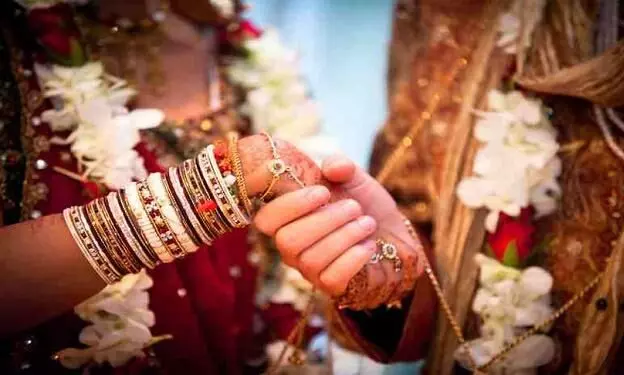
UP registers two cases under new anti-conversion law
text_fieldsLucknow: The Uttar Pradesh police has registered two cases under the controversial Unlawful Religious Conversion Ordinance since its promulgation on Friday. However, the police has invoked the provisions under the new law for the cases registered much earlier.
The first case, was registered at Deorania police station on Saturday in Bareilly, which had originally been registered in 2019.
Dainik Baskar reported that a youth named Uvais was accused of luring the girl to convert. The accused is charged with coercion, undue influence, intimidation among others in the case.
According to reports, the police is searching for the accused who is absconding from home.
The girl, who lives in a village in Deoria was acquainted with Uvais. Both studied in the same college till inter. Family of the girl accuse Uvais of harassing her even after the girl moved to another college for further studies.
Despite the family's effort to withdraw the youth from the attempt, he refused to give-up. Eventually, the girl was married off to another guy in May. However, the Uvais continued to harass her and the family.
The Hindu quoted the girl's brother as saying that the family had not approached the police for the latest FIR, but that it was the police which came to their house to question them about the earlier case.
"Police came to our house. And said there was an old file lying (with them). Police told me they are taking him (father) to the police station for questioning for some investigation," the Hindu quoted him as saying.
The second case was registered on Monday at Izatnagar police station in Bareilly, according to Aaj Tak. As per the complaint, a marriage was consummated under fake identity. Although the case was registered earlier, new charges under the ordinance were imposed on the accused after promulgation of the ordinance.
Under the new law, coerced religious conversions will be treated as cognizable and non-bailable offences, with penalties up to 10 years in jail if the accused is found to have married through "misrepresentation, force, undue influence, coercion, allurement or other allegedly fraudulent means". Other violations in the law also mention that the guilty can be imprisoned for over a year extendable to five years with a fine of Rs 15,000. In case of unlawful conversion of a minor, or a woman of a Scheduled Caste or Scheduled Tribe community, the punishment could be extended to 10 years with a fine of Rs 25,000.
The law has stirred controversy across the country and many have raised concerns fearing the law may be devised against Muslim youth.
BSP supremo Mayawati on Monday demanded the UP government to reconsider the law.
"The new ordinance introduced in haste by the UP government against love jihad is riddled with doubts since religious conversion through compulsion or fraud has found no acceptability or respectability anywhere in the country," BSP chief said today in a Hindi tweet.
Meanwhile former Supreme Court judge Justice Madan B Lokur criticized the ordinance and described it as "placing on the backseat the freedom of choice and dignity".
Justice Lokur was delivering the Seventh Sunil Memorial Lecture held on November 29.
"Although 'love jihad' has no definition, one chief minister has defined it as 'Jihadis playing with the honour and dignity of our sisters and daughters by hiding their real names and identities'. Another chief minister went to the extent of saying that 'if these Jihadis don't mend their ways, it is the beginning of the journey to their graves'. Is this possible death sentence already pronounced sanctioned under the Constitution or by the law? This seems to be a resurgence of the trend of mob lynching...What about the freedom of choice? Why not declare a war on child marriage, which by definition is a forced marriage?", asked Justice Lokur.
"Our carefully-crafted dignity jurisprudence which has been assiduously developed by the Supreme Court over years is being given a cremation of the Hathras kind", he said.






















